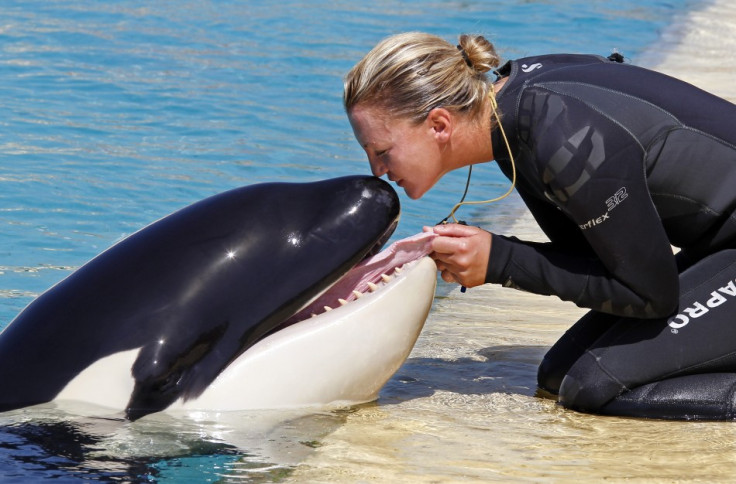Stress in Captivity Causes Whales to Kill Trainers

Killer whales are so traumatised by captivity in tiny pools that they turn on their human trainers and kill or maim them.
According to new research, the distinctive black and white animals, also called orcas, have killed four people and tried to kill or injure dozens more in recent years. There are no reported killings of humans by orcas in the wild.
One of these predatory mammals, called Tilikum, has killed two of his trainers and also a man who broke in to swim in his pool at SeaWorld in Orlando, Florida.
In 2010, he killed his trainer Dawn Brancheau, battering her to death. The six-page autopsy report revealed that Brancheau's left arm and part of her scalp were ripped off.
She suffered spinal cord injuries, and her ribs as well as bones in her legs, arms, and face were broken. She had bruises and cuts all over her body.
"These were not love bites, but the vented fury of an angry and frustrated being who has been deprived of everything in life: family, friends, freedom-all for the sake of human profit and a few giggles," said Ingrid Newkirk, president of Peta (People for the Ethical Treatment of Animals).
David Kirby, author of Death at SeaWorld, said: "Tilikum is a very disturbed and dangerous animal but I know of at least 20 other captive animals showing similar behaviour.
"They bite people, ram them, leap out of the water on top of them and pull them into the water from the side. These are aggressive powerful animals."
In another incident, Kasata pulled a trainer underwater at SeaWorld's San Diego marine park and held him underwater until he almost drowned.
Similar occurrences have happened in Europe, where a trainer was rammed and killed by an orca called Keto at Loro Parque in Tenerife.
"I spent two years tracking down all these incidents. There have been four deaths and many near misses and injuries, I suspect possibly hundreds - no-one likes to report them," said Garbriela Cowperthwaite, the American director of the documentary film Blackfish.
"These are huge and highly intelligent animals. They should not be in captivity."
In Britain, an orca called Cuddles was kept in Flamingo Land, north Yorkshire in the 1970s.
However, Cuddles became so aggressive that his keepers could only clean the pool from the safety of a shark cage.
The UK now bans zoos from keeping whales and dolphins.
Fred Jacobs, a spokesman for SeaWorld said: "This film [Blackfish] appears to repeat the same unfounded allegations made many times by our opponents in the animal rights community. The company is dedicated to the safety of our staff and the welfare of our staff and the welfare of animals. SeaWorld is an accredited and respected zoological institution... and we are held to strict standards of federal and state laws."
Orcas or killer whales are powerful predators capable of killing prey much larger than humans, such as leopard seals and great white sharks.
Killer whales are highly social creatures, hunting in family groups of up to 40 individuals.
© Copyright IBTimes 2025. All rights reserved.




















